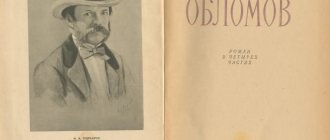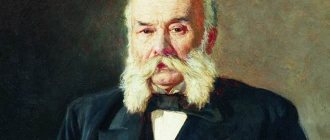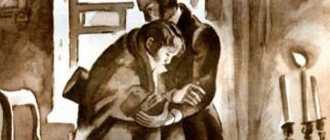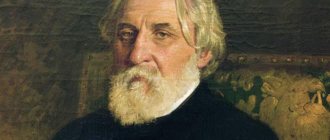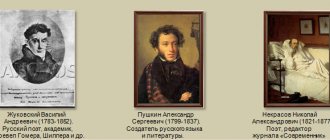Quotes from the novel “Oblomov”: statements by Ilya Oblomov about love, life, happiness, etc.
“Some people have nothing else to do but talk. There is such a calling."
“These are all dead people, sleeping people, worse than me, these members of the world and society! [. ] Aren't these dead people? Don't they sleep sitting all their lives? Why am I more to blame than them, lying at home. "(Oblomov about boring social life)
“There is no business of their own, they are scattered in all directions, not directed towards anything. Beneath this comprehensiveness lies emptiness, a lack of sympathy for everything. "(Oblomov about social life)
". life is poetry. People are free to distort it. "
". self-love is the salt of life. "
“Either I don’t understand this life, or it’s no good. "
“I only shy away from the role of an amateur: it is a dubious and difficult role. "
“It is difficult to be smart and sincere at the same time, especially in feeling. "
“After all, there are such donkeys who get married. "
“Love is a very difficult school of life. "
“Isn’t love service? "
“But you can love a mother, a father, a nanny, even a little dog: all this is covered by the general, collective concept “I love”, like an old... robe...”
". I am in love with you and I say that without this there is no direct love. "(Oblomov about love and falling in love)
“There is no friendship between a man and a woman. »
“..it’s strange, both in grief and in happiness, the same process occurs in the body: it’s hard, almost painful to breathe, you want to cry! If I cried, the tears would make me feel better just like in grief. "(Oblomov about tears)
“Sometimes a person has no control over himself; Some kind of hellish power takes possession of him, darkness falls on his heart, and lightning flashes in his eyes. Clarity of mind fades: respect for purity, for innocence - everything is carried away by the whirlwind; a person does not remember himself; passion breathes on him; he ceases to control himself - and then an abyss opens under his feet. "
“The path where a woman sacrifices everything: peace, word of mouth, respect and finds a reward in love... she replaces everything for her. [. ] Yes, it is a terrible path, and it takes a lot of love for a woman to follow it after a man, perish - and love everything. "
“After all, the criminal must be listened to. "
“Happiness, happiness! How fragile you are, how unreliable! Blanket, wreath, love, love! Where's the money? and what to live with? And you must be bought, love, a pure, lawful good. "(Oblomov about money and love)
“That’s all Andrei: he instilled love, like smallpox, in both of us. "(about Stolz introducing Oblomov to Olga)
“Others will take it and then rush around, work, and not sleep, as if they were letting a demon into themselves. Yes, debt is a demon, a demon that cannot be cast out by anything except money. "(Oblomov about borrowing money)
“There are such good fellows that they live all their lives at someone else’s expense, they will recruit, grab from the right, from the left, and they don’t even give a damn! How they can sleep peacefully, how they eat dinner is unclear. "(Oblomov about debts and debtors)
“Memories are either the greatest poetry when they are memories of living happiness, or burning pain when they touch dried wounds. "
“Reach out your hand to a fallen person to lift him up, or weep bitterly over him if he dies, and do not mock him. Love him, remember yourself in him and treat him as yourself - then I will begin to read you and bow my head to you. "(Oblomov about writers and their characters)
Minor Character Quotes
Sometimes the statements of the novel’s minor characters are no less striking.
“You have to work if you take money...” Sudbinsky .
— His words are consonant with Oblovoa’s views.
“You should never give in to despair: if it grinds, there will be flour..” Alekseev .
— There’s probably no need for any comments here. Words of support, an attempt to make you fight for your life.
“What kind of child is he who has never broken his own or another’s nose?” Stolz's father .
— This phrase has become a catchphrase.
“Life is life, duty, duty, and duty can be difficult.” Olga Ilyinskaya .
“She’s not talking about a monetary debt. Her thoughts are much deeper.
Summary with quotes.
The author calls the region where Oblomov spent his childhood “wonderful,” “blessed corner of the earth.”
There is no sea or mountains in it. But they are not needed. The “wild, grandiose” sea makes people sad . “The man himself is so small, weak, and so imperceptibly disappears into the small details of the larger picture.” Mountains and abysses are also “formidable, scary”, keeping a person in fear for his life.
“This is not the peaceful corner where our hero suddenly found himself.”
The sky there seems to protect a person from adversity, “like a reliable parental roof.” The sun shines hot and bright, giving your favorite place warm and clear days. And it’s so nice to ride on the gentle hills and watch the setting sun. The river runs happily. “smiling” around . I just want to hide, close myself in this corner and “live a happiness unknown to anyone.”
One season follows another correctly and calmly. Everyone is welcomed here with joy. Neither frosts, nor thunderstorms, nor rains are terrible in this region. There are no terrible storms, no destruction, no heavenly signs in it . “How quiet everything is, everything is sleepy in the three or four villages that make up this corner!” “The same deep silence and peace lie in the fields.”
Their inhabitants lived far from other people, rarely came into contact with them - they sold bread on the pier and went to the fair twice a year. They knew little about the white world. “Happy people lived, thinking that it shouldn’t and couldn’t be otherwise, confident that everyone else lived exactly the same way and that living differently is a sin.”
“Sosnovka and Vavilovka were the hereditary homeland of the Oblomov family and therefore were known under the common name Oblomovka.”
Ilya Ilyich is 7 years old.
He woke up, he felt light and happy. “ He’s so cute, red and plump!” The nanny pulls on his stockings, washes him, combs his hair. His mother showers him with kisses and asks if anything hurts and if he slept well. Then they read a prayer, go to their father, drink tea. An elderly aunt, three elderly relatives of my father, old women, and old people also live there. They all begin to shower Ilyusha with caresses and kisses. “...began feeding him buns, crackers, and cream.” Then he is allowed to go for a walk, but the nanny is strictly instructed not to leave him alone.
around with joyful amazement, as if for the first time.” He wants to climb the ladder, go down into the ravine, climb into the dovecote. But they immediately return him back, not allowing him to do anything, lest he fall or hurt himself.
Everything interests the boy. He asks the nanny why it is dark in one place and light in another. He wants to know where Arkhip and his horse went, to run out the gate and see. But the nanny immediately returns him back.
“Not a single detail, not a single feature escapes the child’s inquisitive attention; the picture of home life is indelibly etched into the soul; the soft mind is fed with living examples and unconsciously draws a program for its life based on the life around it.”
And the wife had a lot to do: she needed to check how Ilyusha’s jacket was being altered from her husband’s sweatshirt, and whether the apple that was being prepared for lunch had fallen off. “Caring for food was the first and main concern of life in Oblomovka.” “What stocks there were of jams, pickles, and cookies! What honeys, what kvass were brewed, what pies were baked in Oblomovka !” Everyone in Oblomovka got pies.
At noon, “everything seems to have died out,” everyone is asleep. The nanny, who was watching the child, also fell asleep. “And he was looking forward to this moment with which his independent life began.” He climbed into the dovecote, listened to the buzzing of a beetle, watched a dragonfly (what would happen if you tore off its wings), a spider, how it sucked the blood of a fly. And then he killed both the fly and the spider. He runs into a ravine, but, frightened, runs to the nanny.
Introduction
Goncharov’s work “Oblomov” is a socio-psychological novel written in the mid-19th century. The book tells the story of the fate of the Russian tradesman Ilya Ilyich Oblomov, a personality with a fine spiritual organization, who failed to find his own place in the rapidly changing world of contemporary Russia. The author’s depiction of nature plays a special role in revealing the ideological meaning of the novel - in Oblomov, landscapes are a reflection of the hero’s inner world and are closely related to his feelings and experiences.
Four pores of love
Nature in the novel “Oblomov” carries a special semantic and plot load. First of all, it reflects the state of the hero. The symbol of the tender feeling between Olga and Oblomov becomes a fragile branch of lilac, which the girl gives to Ilya Ilyich, to which he replies that he loves lilies of the valley more, and the upset Olga drops the branch. But on the next date, as if having accepted the girl’s feelings, Oblomov comes with the same twig. Even at the moment when Ilya Ilyich tells the girl that “the color of life has fallen,” Olga again plucks a branch of lilac for him as a symbol of spring and the continuation of life. During the heyday of their relationship, quiet summer nature seems to favor their happiness; its secrets and special meanings are revealed to the lover. Describing Oblomov’s condition, the author compares his happiness with the beauty of a delightful summer sunset.
Nature appears completely different at the moments when Oblomov begins to doubt the bright future of their love, comparing them with rainy weather, a gray sky covered with sad clouds, dampness and cold. At the same time, Olga notices that the lilac has already moved away - as if their love has also moved away. The alienation of the heroes is emphasized by the image of the autumn landscape, flying leaves and unpleasantly screaming crows, when the heroes can no longer hide behind fresh green foliage, comprehending the secrets of living nature and their own souls. The separation of lovers is accompanied by a snowfall, which Oblomov falls under - spring love, the symbol of which was a tender lilac branch, finally dies under a blanket of snow and cold.
The love of Oblomov and Olga seems to be part of that distant, familiar “Oblomov” life to Ilya Ilyich. Beginning in the spring and ending in late autumn, their feelings become part of the natural flow of time of living nature, the change of seasons from birth and flourishing to extinction and death, followed by a new birth - Oblomov’s love for Agafya and Olga for Stolz. At the end of the novel, the author describes the landscape of the modest cemetery where Oblomov is buried. As a reminder of the hero’s wonderful feeling, a lilac planted by friends grows near the grave, and it smells of wormwood, as if the hero had returned to his native Oblomovka again.
OBLOMOV'S TYPE IN DOBROLYUBOV'S ESTIMATESOblomov is an image of a huge generalizing Type of Oblomov meaning. This was noted by N.A. Dobrolyubov in Dobrolyubov, his classic article “What is Oblomovism?”, published shortly after Goncharov’s novel appeared in print.
Dobrolyubov showed that, ideologically, the novel “Oblomov” was certainly a sign of the times, as an expression of a new assessment of life phenomena, as the approach of the time of social work. In the novel, which deeply reflected Russian life, the reader is presented, in the words of the critic, with “a living, modern Russian type, minted with merciless rigor and correctness.”
The main features of the Oblomov type are apathy, laziness and inactivity - “the creation of upbringing and surrounding circumstances.” They are, from Dobrolyubov’s point of view, as much a result of Oblomov’s position as a landowner of the serf era, who had acquired the vile habit of receiving satisfaction of his desires not from his own efforts, but from “strangers,” as from the special makeup of his mental and moral development.
Noting that Oblomov’s worldview is characterized primarily by a view of life as a desire for peace and pleasure, contempt for work and the working part of society, Dobrolyubov points out that Oblomovism was not a new phenomenon in Russian literature, that the features of Oblomovism were inherent to some extent and Onegin, and Pechorin, and Manilov, and Beltov, and Rudin.
Dobrolyubov did not deny, however, some difference between Oblomov and his literary predecessors. This was a natural difference in personal characteristics, temperament and time conditions.
It is quite obvious, for example, that Oblomov has a trait that clearly sets him apart from other “superfluous people.” Oblomov is an incorrigible serf owner, whose landlord psychology is felt in everything.
Following Dobrolyubov, other Russian writers and critics noted the breadth of literary generalization in the image of Oblomov. A.I. Herzen, for example, believed that the Onegins and Pechorins relate to Oblomov like fathers to their children. D.I. Pisarev, a contemporary of Dobrolyubov, also recognized the common properties of Oblomov and other “superfluous people.”
And Dobrolyubov correctly notes one more side in depicting Oblomov’s image. The “superfluous people” of previous decades, in his opinion, are still surrounded by a certain romantic aura and even seem to us to be strong personalities, distorted by life.
Oblomov appears before us as a completely exposed hero, “reduced from a beautiful pedestal to a soft sofa.” Goncharov was given a strict and impartial trial over Oblomovism, and the sentence handed down to the accused turned out to be merciless.
Dobrolyubov viewed Oblomovism as a social evil, the influence of which is felt in the most diverse strata of Russian society - among officials, officers, journalists, and public figures.
In the article “What is Oblomovism?” Dobrolyubov gave an excellent interpretation of Goncharov’s novel. Goncharov himself, having read the article, admitted that the critic “examined Oblomovism very fully and widely” and that “after this nothing can be said about Oblomovism.”
Sbraz Zahara
It’s hard to imagine Oblomov without Zakhara, and Zakhara without Oblomov. A typical servant of the era of serfdom, Zakhar, with his downtroddenness and slave psychology, seems to emphasize the serfdom essence of Oblomovism and helps illuminate the character of Ilya Ilyich in his favorite sphere - in home life.
The image of Zakhar is given in a remarkably prominent way in the novel. Here Zakhar jumps heavily from the couch and appears at the door of Oblomov’s room with a sullen look. First his sideburns are shown, and then he himself is shown in a gray frock coat with a hole under the arm, from which a scrap of shirt sticks out. Oblomov points out to him the disorder in the room, the dust covering things. Zakhar justifies himself: “I try, I don’t regret my life! I wash off the dust and sweep almost every day.” A lazy man to match Oblomov himself, he is sincerely convinced that he fulfills his duties flawlessly. Is it his fault that “you clean it up, and tomorrow there will be dust again”? Oblomov complains: “...I wanted to drink, I took the decanter, but there was no glass.” “You can drink from a decanter!” Zakhar explains good-naturedly.
Zakhar is gloomy and rude. His speech is also rude. “He’s crazy,” he says about the master. “You see, he’s sleeping like an aspen log.” “He’s blowing it up with kvass.” However, he has a good heart. He is affectionate with children, and among the children in the yard he had many of his own little friends. Despite his grumpiness towards Oblomov, Zakhar loved the master in his own way. He was characterized by a “blood, family feeling of devotion... to everything that bears the name of Oblomov, that is close, sweet, and dear to him.” He could not “imagine another master, besides Ilya Ilyich, another existence, how to dress him, feed him, be rude to him, dissemble, lie and at the same time inwardly reverence him.” Without the services of the grumpy, clumsy, but devoted Zakhara, Oblomov is as helpless as a child.
Zakhar is as much a product of serfdom as Oblomov. He and Oblomov are not contrasts, but deeply related natures.
In the gallery of images of servants of the serf era, created in our fiction, Zakhar rightfully takes a place next to the images of Savelich from Pushkin’s “The Captain’s Daughter” and Firs from Chekhov’s “The Cherry Orchard”.
Andrey Stolts
The task of exposing Oblomovism would not have been fully completed by Goncharov if, side by side with Oblomov, he had not shown in the novel a man whose character and activities were a living exposure of Oblomovism. Andrei Stolts is presented as such a person in the novel.
Andrei Stolts is the opposite of Oblomov in all respects. Oblomov is a gentleman. Stolz is a new, bourgeois businessman.
If in Oblomov we see paralysis of the will and endless laziness, then in Stolz we feel unyielding energy. If Oblomov lives by imagination, then Stolz lives by practical deeds, experience, facts. If the ideal of life for Oblomov is serene peace, then in the views of Stolz we find a genuine cult of work, industry, and enterprise.
Stolz has been Oblomov’s friend since childhood, from the time when they were both still studying at Stoltz’s father’s boarding school in Verkhlev. Stolz's life, however, turned out completely differently than Oblomov's life. He is always doing something, striving for something, achieving something. His outlook on life is revealed in the following words: “Work is the image, content, element and goal of life, at least mine.”
Stolz does everything to awaken Oblomov to activity. These attempts lead nowhere, and the life paths of the two friends diverge. While Oblomov is burying himself alive in Pshenitsyna’s house, Stolz is expanding the scope of his activities, greedily taking on new ventures. Stolz follows a lifelong path as a winner. In the novel, this is emphasized by the fact that everything that was especially dear to Oblomov goes to Stolz; he becomes the husband of Olga, Oblomov’s bride; becomes the manager of Oblomov's estate and, finally, the teacher of his son.
This is how the novel affirms the idea: baseless dreamers like Oblomov are being replaced by a new social force, the bourgeoisie, step by step displacing the nobility.
Is Stolz's image typical? Yes, typical in its own way. Bourgeois-capitalist society gave rise to various types of energetic, enterprising businessmen whose goal was personal enrichment. How can we explain, however, that the image of Stolz in Goncharov’s novel turned out to be paler and more sketchy than the image of Oblomov, although the latter lies on the sofa almost all the time, and Stolz is all in motion, in action? This is explained by the fact that the image of Stolz, which was interesting in concept, turned out to be artistically not completed in the novel, and therefore difficult to understand. Stolz is given outside his natural sphere - the sphere of practical activity. The writer mainly talks about it, and does not show it in reality. The reader learns that Stolz has become rich (according to Tarantiev, “made three hundred thousand capital”), that he arranges his and Oblomov’s affairs with unusual ease, but how he does this, the reader does not know.
Goncharov himself was aware that Stolz’s artistic image was “weak, pale - the idea peeks out too barely from it.”
The people who replaced the groundless dreamers and lazy people were demanded by life itself and awaited by society. But Stolz is very far from the ideal of a Russian public figure. He himself admits to Olga: “You and I are not titans... we will not go... to a daring fight against rebellious issues.” That is why Dobrolyubov says about him: “He is not the person who will be able, in a language understandable to the Russian soul, to tell us this almighty word “forward!”
Dobrolyubov, like all revolutionary democrats, saw the ideal of a “man of action” in serving the people, in the revolutionary struggle. Stolz is far from this ideal. However, next to Oblomov and Oblomovism, Stolz was still a progressive phenomenon.
| Serfdom and Oblomovism → |
- ROMAN "OBLOMOV"
THE NOVEL “OBLOMOV” The novel “Oblomov” appeared in print shortly after the end of the Crimean War. What happened…
- FEATURES OF THE ART FORM OF OBLOMOV’S NOVEL
FEATURES OF THE ART FORM OF OBLOMOV’S NOVEL Roman Goncharova is a wonderful example of social...
- Serfdom and Oblomovism
Serfdom and Oblomovism The reader must inevitably ask the question: What kind of serfdom...
- I. A. GONCHAROV CREATION OF A NOVEL OBLOMOV
I. A. GONCHAROV ROMAN OBLOMOV Meanwhile, Goncharov’s official activities continued with their...
- I. A. GONCHAROV THE LAST YEARS OF LIFE
I. A. GONCHAROV THE LAST YEARS OF LIFE After the publication of the novel “Cliff”, Goncharov lived more than two...
Nature of Oblomovka
The most striking landscape of the novel is the nature of Oblomovka, perceived by the reader through the prism of Ilya Ilyich’s dream. The quiet nature of the village, far from the hustle and bustle of cities, attracts with its calmness and serenity. There are no dense, frightening forests, no restless sea, no high distant mountains or windy steppes, no fragrant flower beds, only the smell of field grass and wormwood - according to the author, a poet or dreamer would hardly be satisfied with the simple landscape of this area.
The soft, harmonious nature of Oblomovka did not require the peasants to work, which created a special, lazy mood of life in the entire village - the measured passage of time was interrupted only by the changing seasons or weddings, birthdays and funerals, which just as quickly became a thing of the past, replaced by the calmness of the pacifying nature .
